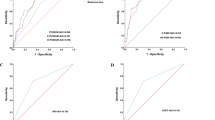Abstract
Background
Gastro-oesophageal surgery is associated with appreciable postoperative morbidity and mortality. POSSUM (Physiological and Operative Severity Score for the enUmeration of Mortality and Morbidity) and its related models P-POSSUM and O-POSSUM have been developed to predict such events in general surgery. The aim was to undertake the first systematic review of the use of these models in gastro-oesophageal surgery patients.
Methods
An online database search was carried out from 1991 to December 2008.
Results
Twenty-two published studies in gastro-oesophageal cancer surgery were identified. Twelve studies were found not to address the above aim, leaving ten relevant publications for analysis. Pooled data from these studies showed the weighted observed-to-expected ratio (O/E) for postoperative mortality using POSSUM (n = 1189), P-POSSUM (n = 2314), and O-POSSUM (n = 1755) was 0.37, 0.83, and 0.51, respectively. The weighted O/E for morbidity using POSSUM (n = 1038) was 0.86.
Conclusion
POSSUM and O-POSSUM most significantly overestimated postoperative mortality in gastro-oesophageal cancer patients. In contrast, P-POSSUM had the least overestimation and may be the most useful predictor of likely postoperative mortality in these patients.

Similar content being viewed by others
References
Koshy M, Esiashvilli N, Landry JC et al (2004) Multiple management modalities in esophageal cancer: epidemiology, presentation and progression, work-up, and surgical approaches. Oncologist 9:137–146
Jamieson GG, Mathew G, Ludemann R et al (2004) Postoperative mortality following oesophagectomy and problems in reporting its rate. Br J Surg 91:943–947
Nagabhushan JS, Srinath S, Weir F et al (2007) Comparison of P-POSSUM and O-POSSUM in predicting mortality after oesophagogastric resections. Postgrad Med J 83:355–358
Copeland GP, Jones D, Walters M (1991) POSSUM: a scoring system for surgical audit. Br J Surg 78:355–360
Whiteley MS, Prytherch DR, Higgins B et al (1996) An evaluation of the POSSUM surgical scoring system. Br J Surg 83:812–815
Prytherch DR, Ridler BM, Beard JD et al (2001) A model for national outcome audit in vascular surgery. Eur J Vasc Endovasc Surg 21:477–483
Prytherch DR, Sutton GL, Boyle JR (2001) Portsmouth POSSUM models for abdominal aortic aneurysm surgery. Br J Surg 88:958–963
Tekkis PP, Prytherch DR, Kocher HM et al (2004) Development of a dedicated risk-adjustment scoring system for colorectal surgery (colorectal POSSUM). Br J Surg 91:1174–1182
Jones DR, Copeland GP, de Cossart L (1992) Comparison of POSSUM with APACHE II for prediction of outcome from a surgical high-dependency unit. Br J Surg 79:1293–1296
Tekkis PP, McCulloch P, Poloniecki JD et al (2004) Risk-adjusted prediction of operative mortality in oesophagogastric surgery with O-POSSUM. Br J Surg 91:288–295
Zafirellis KD, Fountoulakis A, Dolan K et al (2002) Evaluation of POSSUM in patients with oesophageal cancer undergoing resection. Br J Surg 89:1150–1155
Bollschweiler E, Lubke T, Monig SP et al (2005) Evaluation of POSSUM scoring system in patients with gastric cancer undergoing D2-gastrectomy. BMC Surg 5:8
Lai F, Kwan TL, Yuen WC et al (2007) Evaluation of various POSSUM models for predicting mortality in patients undergoing elective oesophagectomy for carcinoma. Br J Surg 94:1172–1178
Otsuka Y, Kunisaki C, Ono H et al (2007) Modified POSSUM to predict postoperative morbidity following gastrectomy. Hepatogastroenterology 54:1142–1145
Lamb P, Sivashanmugam T, White M et al (2008) Gastric cancer surgery—a balance of risk and radicality. Ann R Coll Surg Engl 90:235–242
Gocmen E, Koc M, Tez M et al (2004) Evaluation of P-POSSUM and O-POSSUM scores in patients with gastric cancer undergoing resection. Hepatogastroenterology 51:1864–1866
Internullo E, Moons J, Nafteux P et al (2008) Outcome after esophagectomy for cancer of the esophagus and GEJ in patients aged over 75 years. Eur J Cardiothorac Surg 33:1096–1104
Lagarde SM, Maris AK, de Castro SM et al (2007) Evaluation of O-POSSUM in predicting in-hospital mortality after resection for oesophageal cancer. Br J Surg 94:1521–1526
Sah BK, Min CM, Yan WX et al (2008) Risk adjusted auditing of postop complications in gastric cancer patients by POSSUM. Int J Surg 6:311–316
McMillan DC (2008) An inflammation-based prognostic score and its role in the nutrition-based management of patients with cancer. Proc Nutr Soc 67:257–262
McMillan DC (2009) Systemic inflammation, nutritional status and survival in patients with cancer. Curr Opin Clin Nutr Metab Care 12:223–226
Brosens RP, Oomen JL, Glas AS et al (2006) POSSUM predicts decreased overall survival in curative resection for colorectal cancer. Dis Colon Rectum 49:825–832
Jenkins JT, O’Neill G, Morran CG (2007) The relationship between patient physiology and cancer-specific survival following curative resection of colorectal cancer. Br J Cancer 96:213–217
de Castro SM, Houwert JT, Lagard SM et al (2009) POSSUM predicts survival in patients with unresectable pancreatic cancer. Dig Surg 26:75–79
Moyes LH, Leitch EF, McKee RF et al (2009) Preoperative systemic inflammation predicts postoperative infectious complications in patients undergoing curative resection for colorectal cancer. Br J Cancer 100:1236–1239
Author information
Authors and Affiliations
Corresponding author
Rights and permissions
About this article
Cite this article
Dutta, S., Horgan, P.G. & McMillan, D.C. POSSUM and Its Related Models as Predictors of Postoperative Mortality and Morbidity in Patients Undergoing Surgery for Gastro-oesophageal Cancer: A Systematic Review. World J Surg 34, 2076–2082 (2010). https://doi.org/10.1007/s00268-010-0685-z
Published:
Issue Date:
DOI: https://doi.org/10.1007/s00268-010-0685-z




